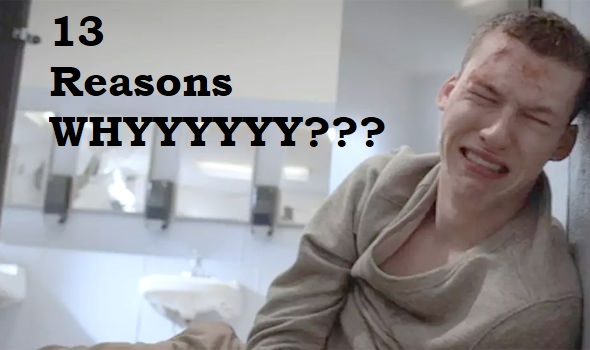
Spoiler Warning!
Trigger Warning!
It’s not really possible to talk about 13 Reasons Why without a trigger warning. Suicide and rape will be discussed at length, and I’m sure I’ll make light of both at one point or another.
I normally stray away from reviewing television, but because I’ve devoted 26 hours of my life to this thing, I feel a bit obligated to talk about 13 Reasons Why. You know, because I suddenly feel the need to start a conversation.
When the show first popped up on Netflix last year, I noticed that the early reviews were nothing but positive, so I quickly plowed my way through 13 hours of mostly-compelling television. The show was unnecessarily melodramatic at times, its character motivations were often questionable, and the writing wasn’t always stellar. Regardless, I felt like the show had enough impactful moments to really win me over, and by the end, I somewhat cared about most of the characters. It was also tailor-made for binging, and in my opinion, handled the main character’s suicide brilliantly, especially given the fact that we knew it was coming from the very beginning of episode one. I thoroughly enjoyed my time with the first season, even though it was often cliché and cheesy. I don’t know just how unpopular this opinion is, but I enjoyed it as a sleazy CW-esque melodrama that managed to rise above its melodramatic roots.
A few weeks later, critics of the show came out in force, and defenders came out in equal measure.
Those who took issue with the show just wouldn’t shut up about how many teenagers were definitely going to kill themselves after watching it. The quality of the show was also frequently questioned, and it quickly became one of the most controversial teen melodramas in recent memory. Accusations about the show glorifying and romanticizing suicide were all over the internet. Every aspect of the show was on public trial, and detractors certainly never hesitated to start a conversation about how awful every aspect of the show was.
On the other hand, those that defended 13 Reasons were often equally unreasonable. This camp’s first response to the show was usually, “This needs to be shown in every high school!” It was praised for raising suicide awareness, because apparently we didn’t know suicide was a thing that happened before this Netflix melodrama became available for streaming. If you were critical of it, you were suddenly a boulder blocking the path to progress, or you “didn’t get it.” Criticism also made you responsible for every suicide after the release of the show. Perhaps that’s missing the point, because this 13-episode series just wants to start a conversation, right?
After enduring a large amount of criticism, Netflix finally put up a trigger warning before the show, and a more extensive trigger warning for episodes involving rape and/or graphic on-screen suicide was used when appropriate. I struggle to find rationale for the latter, because I don’t know a single person who would watch 2/3 of the show, then drop it because of a trigger warning. This was almost certainly a way for Netflix to protect themselves legally.
There are several criticisms of season 1 that have a substantial impact on season 2. 13 Reasons Why (season 1) is based on a book. In the book, Hannah offs herself and leaves behind 13 tapes explaining what led up to her suicide. The protagonist is some co-worker and sort-of love interest named Clay. Clay spends one evening wandering around town as per Hannah’s instructions, and that’s pretty much it. The first season takes the book’s concept, adds several characters, and drastically expands the role of each, with every episode focusing on one character’s tape. Book-lovers of course hated all of the non-book characters, as well as the other changes made, such as the nature of Hannah’s suicide. She pops a few pills in the book, but in the show, she slits her wrists and bleeds out, and we see it all in excruciating detail. In addition, the show has Clay listening to each tape one episode at a time, and an episode covers at least one full day in the context of the story. Each character is somewhat disgusted with Clay for taking so damn long to listen to them all, and it’s easy for the viewer to come to the same conclusion.
The most egregious book-to-show alteration was season 1’s cliffhanger. It involves a character named Tyler, who took photos of Hannah from just outside her bedroom window without her consent. Immediately before the season ends, we see hints that Tyler is about to go full Columbine and shoot up a school. This setup was completely unnecessary, but was definitely an intriguing teaser for what season 2 could be about. This wouldn’t be such an awful choice, except that season 1 left us with at least one dangling plot thread per character. Audiences were understandably frustrated that what should have been a self-contained season was clearly setting itself up to be a long-running show.
And so, the controversy, popularity, and binge-ability of 13 Reasons Why lead to a very large amount of viewers, and as planned, a thirst for season 2. I’ll admit, I was excited to see where season 2 was going, but also harbored the suspicion that without at least a little guidance, it would quickly veer into unfocused, nonsensical bullshit.
Like Tyler’s anus after an unwanted encounter with a mop handle, I feel used. So, let’s start a conversation.
The first season had an interesting structural gimmick built in because of its source material, and season 2 certainly makes an attempt to replicate this. Hannah’s mother and her lawyer are bringing a lawsuit against the school for neglecting to notice that she was suicidal, and doing nothing to stop her. Each episode is highlighted by a single person’s testimony that conveniently reflects the plot of the episode.
Also, someone is sending Polaroids of Bryce, Hannah and Jessica’s rapist from season one, getting it on with some passed-out hotties, implying that Bryce is probably a serial rapist. Respectively, episodes 1, 4, 7, and 12 are named, “The First Polaroid,” “The Second Polaroid,” “The Third Polaroid,” and “The box of Polaroids.” It’s a secondary gimmick, it’s completely unnecessary, and it results in one of the most frustrating scenes in the series. Jessica discovers that Clay & company have these pictures. She snatches them up, saying, “This isn’t your story to tell!” and before you know it, the photos have been stolen, and the most convincing piece of evidence against Bryce The Rapist is up in flames.
As was announced prior to release, every episode of season 2 is book-ended by cast members reading lines about how suicide is bad, and suicide hotlines exist. Before episode 1, there’s a montage of most of the cast members talking about anti-suicide resources, and once again stating that they only wish to start a conversation. They seem to enjoy starting a conversation. It seems to be this series’ excuse for literally everything.
There is one glaringly distracting aspect of this that both bothered me and had me rolling on the floor laughing hysterically at the sheer irony. The actor who plays Bryce The Rapist is featured prominently. This isn’t an actor I can name, nor an actor that I know from any other roles. To me, this man is just an actor who plays a rapist, so to hear him lecture me about suicide prevention before season 2 even starts is irony at its finest.
At the end of season 1, Tyler was about to shoot up a school, Clay had just obtained Bryce’s confession, Alex had shot himself, Justin had left town, and Jessica was pissed at everyone. The season begins five months after these events.
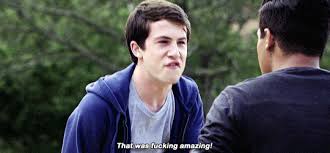
Clay has tried to move on by dating Skye, a girl who clearly has emotional problems and exists as Hannah’s surrogate for a few episodes before being sent away to a mental hospital for the remainder of the season. Clay’s relationship begins to fall apart when he begins to hallucinate the ghost of Hannah. This was a gimmick used in the first season, usually to half-decent dramatic effect, but this time around, Clay has a full-on conversation with Hannah about whether or not she’s really there, the nature of her ghost, and whether or not Clay is crazy. Given the way Hannah delivers only the information that Clay would already have, it’s very obvious that he’s hallucinating, but for a while, they try to play it up as a mystery. Even after it’s been established that she’s not a ghost, Clay continues conversing with her throughout the entire season, and it’s exceptionally cringe-worthy and cheap.
At the end of episode 1, Clay finds a Polaroid in his locker of Bryce engaging in questionable behavior, with a note that says, “Hannah wasn’t the only one.” We already know that Bryce raped Jessica, but we eventually find out that there’s some kind of a rape den used by the jocks of the school. The “other victim” referred to is just another newly introduced character with little to do, but it’s implied that rape is just kind of a routine thing among the football team.
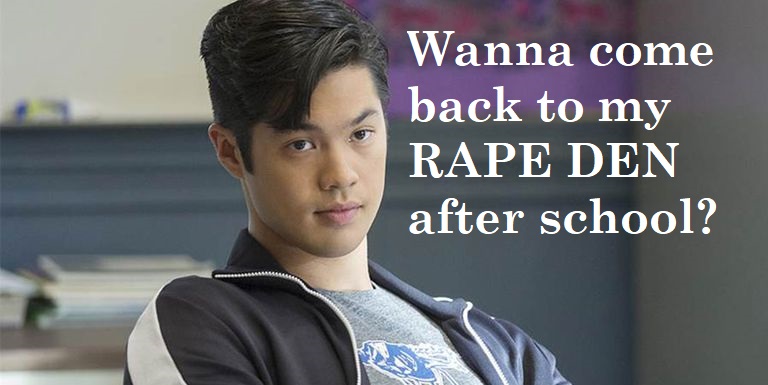
There’s a long ordeal about finding the location of this rape den, and when our characters finally do figure it out, Zach appears for no reason other than to hand them a box of pictures. Zach is the Asian jock who knows Bryce is an asshole, is made out to be very kind by nature, and has absolutely no balls. He continues to hang out with Bryce off and on during the whole show, in spite of knowing what Bryce was up to with Hannah. His character becomes even more baffling when he finally testifies. Apparently, Zach and Hannah spent an entire summer making passionate love, and when school started, Zach told Hannah they should forget the whole thing, because he wanted to protect his jock reputation. This makes very little sense, given that we’ve never seen any indication that Zach had a romantic interest in Hannah, and the fact that, in a more realistic setting, Zach would have likely been bragging to his friends about his conquest. Zach’s bizarre romance with Hannah is made even more tacked-on when the show forgets Zach’s testimony almost entirely, and reveals that Bryce had a relationship with Hannah. In the grand scheme of things, the fact that Bryce and Zach were both into Hannah has absolutely no impact on the events that transpired.
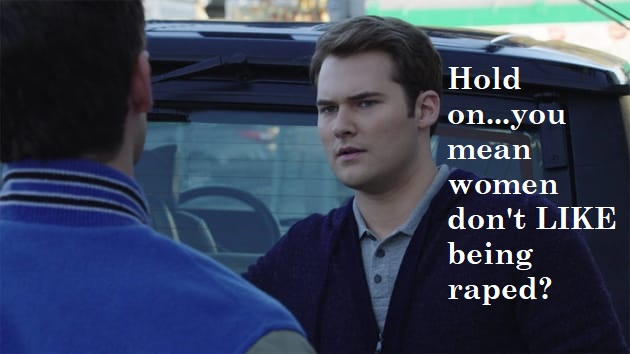
In addition to rapin’ all the girls at Liberty High, Bryce is also tapping a cheering named Chloe, who is played off as not being very bright. She has a few mysterious bruises after she begins dating Bryce, but remains in denial. While they’re having sex, which happens on-screen way too frequently, you can tell that Chloe is at least slightly uncomfortable. Eventually, a photo surfaces of Bryce raping Chloe while she’s passed out. She still lies to the court about whether or not she was raped, and at the end of the season, discovers she’s pregnant.
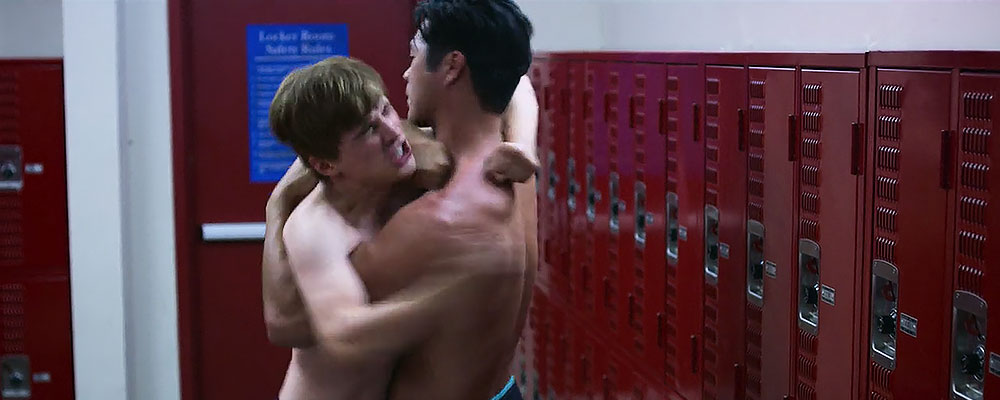
Alex spends season 2 recovering from his suicide attempt. Having taken a bullet to the head, he now conveniently has amnesia, and forgets everything about the tapes. His entire arc revolves around trying to remember what was on the tapes, and trying desperately to get his dick to work so he can make sweet love to Jessica. Zach helps Alex with his physical therapy, and this produces my favorite so-bad-it’s-good line of the season. Zach is attempting to console Alex, who is having erectile dysfunction, and Alex shouts, “At least you can walk and have sex with girls!” He says this with a great amount of sincerity before realizing that he now has an erection. Alex is absolutely thrilled at the implications of his locker room boner, but Zach’s bromophobia kicks in and the scene ends. When Alex finally obtains a copy of the tapes toward the end of the season, he cries a little. This is the payoff for Alex’s entire arc.
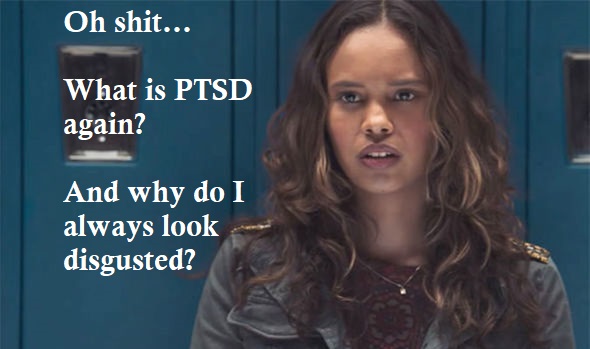
For a while, Jessica is very receptive to the idea of grinding all over Alex’s crippled body, but then the PTSD kicks in. This prompts her to join a support group, where she’s encouraged to share her story. Her raging PTSD is essentially her only role in the rest of the season, although she’s often a bright spot. Her portrayal of the symptoms of PTSD is just a notch more accurate than you’d typically see on film, but it’s still inconsequential to the plot.
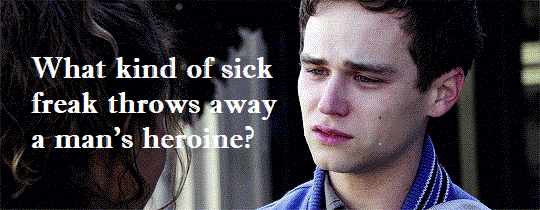
Clay and Tony eventually manage to track down Justin after all this time, and he stays with Clay unbeknownst to Clay’s parents. Justin is now a heroin addict, and we get to witness his withdrawal. Fun! He testifies about Bryce raping Hannah, surprising approximately no one. Clay’s parents adopt him out of guilt.
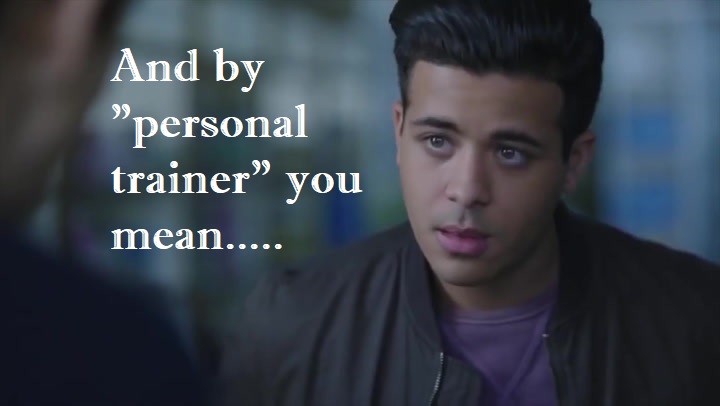
The enigmatic Tony is revealed to have anger problems, which isn’t so much of a reveal as a statement of fact. He starts banging his personal trainer.
*Yawn*
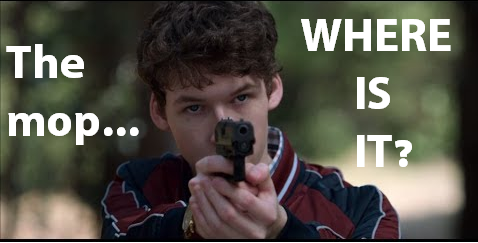
By far the most annoying, disgusting, hilarious, and outlandish subplot in season 2 is that of Tyler’s. The peeping tom, who we’ve established has a gun hidden in his room, befriends a group of high school stereotypes who call themselves freaks, and look like fairly typical trench coat mafia rejects. In particular, Tyler is drawn to Cyrus, a fairly low-key freak with outstanding guy-liner. Tyler and Cyrus are vessels for some of the worst foreshadowing I’ve seen in my life.
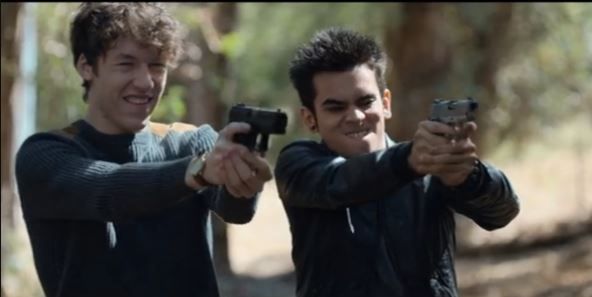
As the season goes on, episodes begin to drop Columbine hint after Columbine hint. Tyler and Cyrus begin wearing T-shirts that say “assholes” (that’s some serious unintentional foreshadowing) and a few times, they even don trench coats. They go out into the woods to shoot guns at glass bottles, and are caught by a neighbor. Cyrus’ sister walks into the basement while the two are working on something that’s obviously a bomb, and they both get very defensive about it.
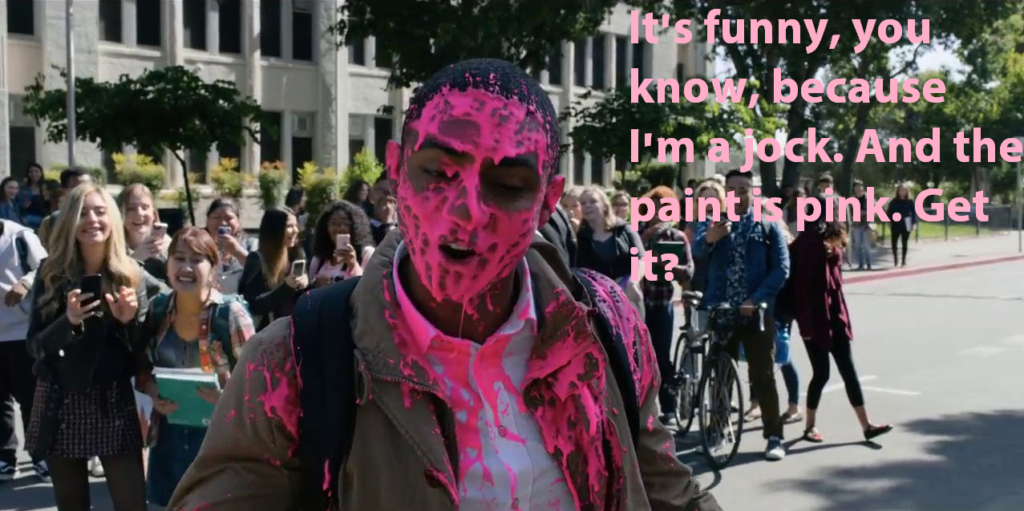
Then, Tyler and Cyrus are seen walking through the halls with large duffel bags. They place one on the ground outside school, and it’s immediately assumed to be a bomb. Marcus, one of the jocks who hurt Hannah, carefully approaches the duffel bag, only to have it explode, spraying pink paint all over his face. It’s a stunningly stupid cop-out, and while at first I was okay with the fact that they kept subverting the Columbine stereotypes, the ending of the season changed my opinion.
Cyrus finally realizes that Tyler is a little more serious about “fucking shit up” than he originally thought, and attacks Tyler for being romantically interested in Cyrus’ sister. This relationship was initiated by the sister, so his reaction feels unwarranted. Tyler is gradually worn down by several instances of bullying. In the final episode, he’s confronted in the bathroom by Montgomery, one of Bryce’s jock cronies, and two nameless jock sidekicks. Out of sheer spite, they hold Tyler down as Montgomery repeatedly shoves a thick mop handle into Tyler’s ass. The mop rape scene is certainly the most wild aspect of this season, and definitely the most unnecessary.
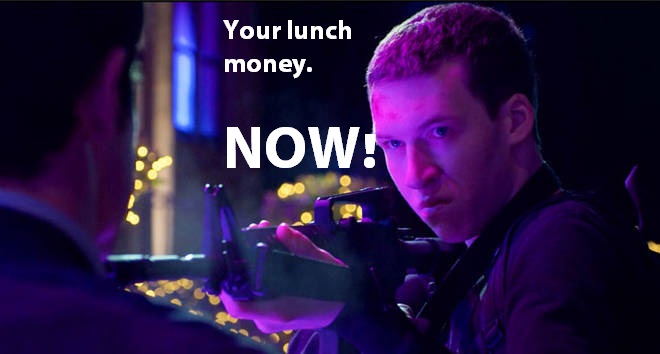
When Tyler goes home, he tells his parents that everything is okay, and then proceeds to sit on the toilet bawling his eyes out as he reaches toward his behind and pulls out a hand covered in blood. From this point on, he’s completely emotionless. He grabs his gun and heads to the school dance that’s inexplicably being held on the same day as Hannah’s funeral. Clay and company stop Tyler outside the school, and Clay convinces him to hand over the gun. Tony randomly pulls up and tells Tyler to get in the car as police sirens are heard in the background. Tony and Tyler drive off, and as the police approach, Clay is still awkwardly holding the gun as if it were a used diaper. We fade to black, and this is our cliffhanger.
The shocking stupidity of this ending (heh) and the extreme brutality of Tyler’s mop rape just left a horrible taste in my mouth (Hehe.) Season 2 not only manages self-sabotage, it actually makes season 1 far more difficult to tolerate by arbitrarily filling in “gaps” in the first season that didn’t need to be filled. (Hehehe.) And yet, this is not my biggest grievance.
The lawsuit itself, and the way the show treats it, encompasses my biggest problem with the show as a whole. When the concept of suing the school was first brought up in season 1, the show didn’t really take much time to explore whether or not the lawsuit was morally justified. Is this a moment where we’re supposed to shout, “You go girl!” at Hannah’s mother, or is she about to learn that making an attempt to assign blame is the least productive way to go about this? After season 2, I think I can confirm it was the former.
Culpability in cases of suicide is complex. Most of the time, those close to the individual feel somewhat responsible, even if their perceived wrongdoing wasn’t as much of a contributing factor when it came down to it. Of course, blaming others is fairly common as well. Blaming the individual, while not usually considered a “nice thing to do”, is another natural reaction. In season 1, I felt that the show gave us each of these reactions in fairly equal measure. It was accused of not addressing the issue of culpability at all, but I felt that was part of the point. There are many issues the first season refused to take a firm stance on, and I assumed it was trying to get across the idea that culpability is never simple when dealing with suicide. People, teenagers especially, are constantly misunderstanding each other’s motivations, falling into group-think without giving a second thought to the ramifications of that, bullying each other to fit in, struggling internally, and generally being petty. It’s a combination of these scenarios, and misinterpretations of them, that often causes those with a chemical imbalance to consider ending their own lives, and at the end of the day, assigning blame can be rather counterproductive. The series has never explicitly stated this, but I assumed it was the implied intent of the show.
In this season, the focus is on whether or not the school did everything in its power to stop this from happening. This is a perspective represented by the guidance counselor at the end of season 1, who knew that Hannah was feeling suicidal, but when trying to help her, failed to notice that her sudden turn from “help me” to “I’m fine” was a clear sign that something was very wrong. After all the testimonies we see in season 2, the school is found not guilty, and the verdict is treated as a horrible miscarriage of justice. While I understand that schools aren’t quite as equipped as they should be in regards to maintaining the mental health of their students, I don’t understand why it’s automatically assumed that this makes the school responsible. Furthermore, I don’t understand why this merits a damn lawsuit, so when the not guilty verdict is read, I wasn’t surprised in the least, but the show felt like it wanted me to be. To me, this was the season’s “big reveal”; the revelation that I was supposed to be supportive of this farce of a lawsuit the whole time.
If you thought season 1 was potentially exploitative and manipulative, season 2 amps that up to 11.
Start a conversation with your loved ones, and let them know that if 13 Reasons Why Season 2 sounds like an appealing watch, think again.
13/100